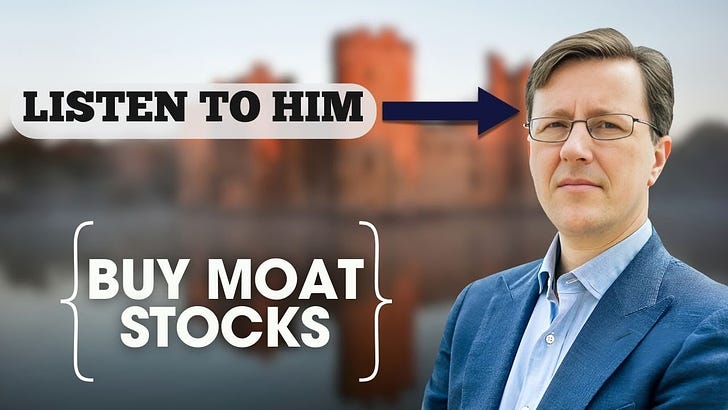Pat Dorsey: Buy Wide Moat Stocks
The man has a lot to teach. But did he forget the most important thing?
YouTube
Spotify
Apple Podcasts
This week, we released a podcast on Pat Dorsey. Dorsey is an investor who was big at Morningstar and then started his own fund called Dorsey Asset Management.
His focus is on analyzing, investing in, and teaching others about wide-moat companies.
He has many lectures online, including this one at Google:
After reading his book, watching his lectures, and looking at his fund, I think we can boil down his philosophy to:
Capitalism is brutal. All top-performing stocks need to have a competitive advantage in order to maintain outsized profitability.
Study all the top-performing stocks to find patterns in these competitive advantages.
Use this pattern matching to find new stocks to buy.
Pay attention to valuation
The categories of competitive advantages include network effects (Visa, Mastercard), economies of scale (Costco), switching costs (Oracle), and intangible assets (brands like Apple). We cover all four in depth in this episode.
I love these moat categories and use them consistently when trying to find stocks to buy. Building up the muscle of pattern-matching qualitative factors is one of the few advantages little guys like myself have over big funds.
I’m not going to be better than the institutions at estimating Apple’s upcoming earnings. But I can — at least for a subset of companies in my circle of competence — gain an edge by understanding why a company has a wide moat.
Wide moats equal pricing power. Pricing power equals durable earnings growth. Durable earnings growth equals cash getting returned to shareholders and multiple expansion. It’s that simple.
We cover the importance of moats for close to an hour in this episode. Dorsey covers them at even greater length in many lectures.
But is he focused too much on moats?
I think he might be.
See, when I look at the large mistakes in his portfolio (Disney, PayPal, Wix), he found companies that may have a strong moat. Well, maybe not PayPal, not sure what he was thinking there.
However, all three of these companies had or still have poor executive teams. When I say “poor” I mean bad managers for shareholders. They don’t care about them. They may care about size, prestige, or appeasing Wall Street, but they sure as hell don’t prioritize increasing per share intrinsic value for their stockholders.
Which is all you should care about.
At Chit Chat Stocks, we are looking for a combination of moat, excellent management, and a reasonable valuation. This trifecta is hard to beat, which is why I sound like a broken record talking about it all the time.
It truly is all that matters, though. I think Pat Dorsey — through what he did and didn’t focus on — is another example of that.
-Brett
Chit Chat stocks is presented by:
Public.com has just launched its BOND ACCOUNT. Lock-in interest rates of 6.9% (as of 8/28/24) through 2028 right before the Federal Reserve is set to lower interest rates!
With as little as $1,000, the bond account allows you to buy a diversified portfolio of bonds and lock in your yield even if the Federal Reserve cuts rates.
It only takes a couple of minutes, get started today at Public.com/chitchatstocks and open up a bond fund today!
A Bond Account is a self-directed brokerage account with Public Investing, member FINRA/SIPC. Deposits into this account are used to purchase 10 investment-grade and high-yield bonds. The 6.9% yield is the average annualized yield to maturity (YTM) across all ten bonds in the Bond Account, before fees, as of 8/28/2024. A bond’s yield is a function of its market price, which can fluctuate; therefore a bond’s YTM is “locked in” when the bond is purchased. Your yield at time of purchase may be different from the yield shown here. The “locked in” YTM is not guaranteed; you may receive less than the YTM of the bonds in the Bond Account if you sell any of the bonds before maturity, or if the issuer calls or defaults on the bond. Public Investing charges a markup on each bond trade. See our Fee Schedule.
Bond Accounts are not recommendations of individual bonds or default allocations. The bonds in the Bond Account have not been selected based on your needs or risk profile. You should evaluate each bond before investing in a Bond Account. The bonds in your Bond Account will not be rebalanced and allocations will not be updated, except for Corporate Actions.
Fractional Bonds also carry additional risks including that they are only available on Public and cannot be transferred to other brokerages. Read more about the risks associated with fixed income and fractional bonds. See Bond Account Disclosures to learn more.



